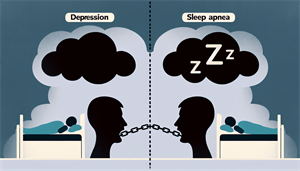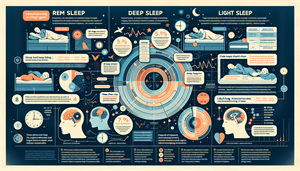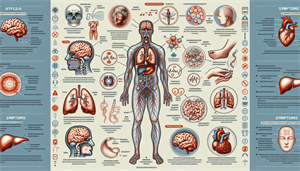
Can Depression Cause Sleep Apnea?
Have you ever wondered about the intricate link between sleep apnea and depression? These two conditions, while seemingly disparate, share a complex, bidirectional relationship that can significantly impact one’s quality of life. A common question that arises is, can depression cause sleep apnea? Let’s dive deeper into this intriguing interplay.
Key Takeaways
Sleep apnea, especially obstructive sleep apnea (OSA), is closely linked with various mental health conditions such as major depressive disorder (MDD) and anxiety, with sleep deprivation being a key factor in the bidirectional relationship. Symptoms of sleep apnea and depression often overlap, including daytime sleepiness and irritability, which can complicate diagnosis and treatment, highlighting the need for professional evaluation and intervention. Treating sleep apnea with methods such as CPAP therapy can have positive effects on depression, suggesting that addressing sleep issues may also aid in alleviating depressive symptoms and improving overall mental health.
The Bidirectional Relationship Between Sleep Apnea and Depression
Sleep apnea, particularly the most common type - obstructive sleep apnea (OSA), also known as obstructive sleep apnoea, is a serious condition characterized by intermittent interruptions in breathing during sleep, often referred to as sleep disordered breathing. It’s more than just a physical health issue. Emerging evidence suggests that sleep apnea, and specifically obstructive sleep apnea severity, is intricately connected with mental health conditions, including: major depressive disorder (MDD) anxiety disorders bipolar disorder post-traumatic stress disorder (PTSD) attention-deficit/hyperactivity disorder (ADHD) schizophrenia
The root cause of this relationship? It’s mainly due to sleep deprivation, a frequent consequence of sleep apnea. Sleep apnea and depression feed into each other in a reciprocal manner, where sleep deprivation due to sleep apnea can elevate the likelihood of developing depression and anxiety. In turn, depression can lead to deteriorated sleep quality, creating a vicious cycle. Additionally, severe obstructive sleep apnea can independently increase the risk of depression. It’s not hard to see why - excessive daytime sleepiness, a common symptom of sleep apnea, can significantly hamper one’s daily functioning, often leading to a depressed mood and other depressive symptoms.
This intricate interplay between sleep apnea and depression is further complicated by the fact that many individuals remain undiagnosed. Many people with sleep apnea are not aware of their condition, attributing their excessive daytime sleepiness and other symptoms to stress or a busy lifestyle. The same is true for depression - many individuals with depressive symptoms do not seek help due to the stigma associated with mental health conditions. So, it’s clear that sleep apnea and depression are more interconnected than we might assume. But to fully appreciate this connection, we need to delve deeper into the role of sleep deprivation, a common denominator between these two conditions.
The Role of Sleep Deprivation
Sleep disorders like obstructive sleep apnea syndrome often result in sleep deprivation. It’s not just about feeling tired or sleepy during the day. Chronic sleep deprivation can lead to neurochemical changes in the brain, leading to depression. Furthermore, sleep deprivation can inflict neurological damage on the hippocampus, interfere with emotional processing, and escalate the risk of cognitive impairment. This neurological toll can further exacerbate depression symptoms, creating a vicious cycle. The psychological repercussions of prolonged sleep deprivation are equally concerning. They range from heightened stress and anger levels to increased negative emotional responses to stressors and reduced positive emotional regulation.


